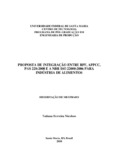| dc.creator | Nicoloso, Tatiana Ferreira | |
| dc.date.accessioned | 2010-11-17 | |
| dc.date.available | 2010-11-17 | |
| dc.date.issued | 2010-03-19 | |
| dc.identifier.citation | NICOLOSO, Tatiana Ferreira. Integration proposal of GMP, HACCP, PAS 220:2008 and NBR ISO 22000:2006 for food industry. 2010. 70 f. Dissertação (Mestrado em Engenharia de Produção) - Universidade Federal de Santa Maria, Santa Maria, 2010. | por |
| dc.identifier.uri | http://repositorio.ufsm.br/handle/1/8161 | |
| dc.description.abstract | In Portuguese, safety means the condition of somebody or something that you can trust. So, food security is related to the consumer trust in receiving an enough amount of food
for survival; while the safety of food means the consumer trust in food that does not damage health. Food safety patterns should be the same, no matter what the level of market development is, but this is not the Western and Eastern perception. So, there is a need to improve the quality systems in the Brazilian market in order to guarantee safety and food quality. This can be done by implementing tools and standards that ensure food safety.
Therefore, the main purpose of this work is to propose an integration model of the tools of Good Manufacturing Practice (GMP), the Publicly Available Specification (PAS 220:2008), the Hazard Analysis and Critical Control Point System (HACCP) and the NBR ISO 22000: 2006 standard Food Safety Management System (FSMS). In order to do that, we have included a literature review of the related topics as well as a description of the NBR ISO 22000. Afterwards, we have described the methodology used, the interpretation of the tools and standard requirements in an integrated way, so as some recommendation for their requirement implementation. Based on the results obtained in this study, we believe that the integration proposal and the recommendations for the tools implementation HACCP, PAS
220:2008 and Good Manufacturing Practice (GMP), associated with the NBR ISO 22000 standard, presented in this paper, may help food companies reach high quality levels and the
innocuity of the food produced. | eng |
| dc.format | application/pdf | por |
| dc.language | por | por |
| dc.publisher | Universidade Federal de Santa Maria | por |
| dc.rights | Acesso Aberto | por |
| dc.subject | Segurança de alimentos | por |
| dc.subject | APPCC | por |
| dc.subject | BPF | por |
| dc.subject | Food safety | eng |
| dc.subject | HACCP | eng |
| dc.subject | GMP | eng |
| dc.title | Proposta de integração entre BPF, APPCC, PAS 220:2008 e a NBR ISO 22000:2006 para indústrias de alimentos | por |
| dc.title.alternative | Integration proposal of GMP, HACCP, PAS 220:2008 and NBR ISO 22000:2006 for food industry | eng |
| dc.type | Dissertação | por |
| dc.description.resumo | Segurança, na língua portuguesa, significa a condição daquele ou daquilo em que se pode confiar. Assim, a segurança alimentar está relacionada à confiança do consumidor em
receber uma quantidade suficiente de alimentos para a sua sobrevivência; enquanto segurança do alimento significa a confiança do consumidor em receber um alimento que não cause dano à sua saúde. Os padrões de segurança de alimentos deveriam ser os mesmos, independentes
do nível de desenvolvimento do mercado. Fica assim explícita a necessidade do mercado brasileiro de aprimorar os sistemas de qualidade, objetivando garantir a segurança e a
qualidade dos alimentos. Isso pode ser realizado através da implantação de ferramentas e normas que visam a garantir a inocuidade dos alimentos. Este trabalho teve como objetivo
principal propor um modelo de integração entre as ferramentas de Boas Práticas de Fabricação (BPF), o Publicly Available Specification (PAS 220:2008), o Sistema de Análise
de Perigos e Pontos Críticos de Controle (APPCC) e a norma NBR ISO 22000:2006 - Sistema de Gestão de Segurança de Alimentos (SGSA). Para tal, fez-se necessário uma revisão
bibliográfica dos temas relacionados e uma descrição sobre a norma NBR ISO 22000. Posteriormente, foi detalhada a metodologia utilizada e a interpretação dos requisitos das
ferramentas e da norma de forma integrada, sendo também descritas algumas recomendações para a implantação dos requisitos das mesmas. A partir dos resultados obtidos no estudo, acredita-se que a proposta de integração e as recomendações para implantação das ferramentas APPCC, PAS 220:2008 e Boas Práticas de Fabricação, em conjunto com a norma NBR ISO 22000:2006, apresentada neste trabalho, podem auxiliar as empresas do setor de alimentos a atingirem níveis de qualidade mais elevados e a inocuidade dos alimentos fabricados. | por |
| dc.contributor.advisor1 | Schmidt, Alberto Souza | |
| dc.contributor.advisor1Lattes | http://lattes.cnpq.br/2214080795054032 | por |
| dc.contributor.referee1 | Rosa, Leandro Cantorski da | |
| dc.contributor.referee1Lattes | http://lattes.cnpq.br/0989065569520206 | por |
| dc.contributor.referee2 | Hecktheuer, Luisa Helena Rychecki | |
| dc.contributor.referee2Lattes | http://lattes.cnpq.br/7926116604048817 | por |
| dc.creator.Lattes | http://lattes.cnpq.br/6307707425510856 | por |
| dc.publisher.country | BR | por |
| dc.publisher.department | Engenharia de Produção | por |
| dc.publisher.initials | UFSM | por |
| dc.publisher.program | Programa de Pós-Graduação em Engenharia de Produção | por |
| dc.subject.cnpq | CNPQ::ENGENHARIAS::ENGENHARIA DE PRODUCAO | por |


